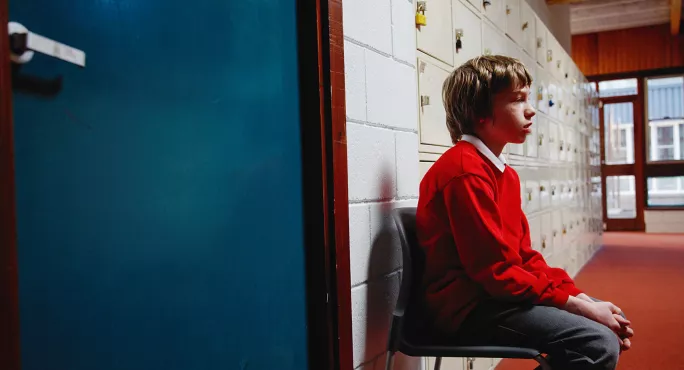EPI: Schools need guidance for pupils with multiple suspensions

Schools need guidance on supporting pupils with multiple suspensions, according to a report that shows students removed from the classroom are more than twice as likely to fail to achieve a level 3 qualification such as an A level.
A report by the Education Policy Institute (EPI), published today, also shows that young people suspended during secondary school are twice as likely to be out of education, employment or training by the age of 24.
However, the report does highlight that the “link between suspension and outcomes in adulthood may be indirect, as suspended pupils have lower GCSE grades, on average, which may, in turn, limit access to further education opportunities”.
The research, which studied a cohort of more than half a million students who started Year 7 in state-funded schools in 2006, found that around 16 per cent of students were suspended at least once in secondary school.
It comes as Department for Education data published earlier this year revealed that school suspensions of students in 2022-23 hit a record high, with the number of temporary removals from classrooms soaring by a third.
The newly appointed DfE minister Stephen Morgan said at the time that the figures were “shocking” and a “wake-up call”.
More guidance needed
The report - commissioned by youth education charity Impetus - recommends that the DfE “should develop the evidence base on what works to support pupils who experience multiple suspensions”.
It adds that the existing guidance “provides little direction on how to effectively support pupils experiencing repeated suspensions beyond a recommendation to implement additional strategies”.
- Labour: Morgan sounds ‘wake-up call’ as suspensions hit record high
- DfE: Suspensions up by three-quarters since pandemic
- FFT: ‘Increase’ in pupil suspensions and exclusions last term
Given the increase in the number of secondary school students experiencing one or more suspensions, the EPI states that “this lack of guidance is concerning”.
And the report emphasises the need move beyond “the current reliance on repeated exclusionary measures that may fail to tackle the root issues”.
‘Early intervention is essential’
The authors of the report argue that their research “bolsters” the case for early intervention, as neglecting to address the factors leading to suspension “could contribute to long-term consequences for the individual and materialise in wider costs to society”.
The DfE “should consider conducting a programme of work which sets out how to best respond to behaviour that reflects the evidence on in-school and out-of-school drivers”, the EPI recommends.
The EPI also calls for research to interrogate the drivers for the recent rise in suspensions in secondary schools.
Tes revealed earlier this year that the national behaviour tsar had urged the next government to oversee a “massive reinvestment in the alternative provision estate” to provide for a “significant minority” of students in mainstream schools “whose needs can very rarely be met” by them.
Commenting on the report by the EPI, Pepe Di’Iasio, general secretary of the Association of School and College Leaders, said that the analysis reported that students with behavioural challenges serious enough to result in suspensions is “a considerable challenge for schools”.
Mr Di’Iasio also said “early intervention is essential” to stop behavourial issues from escalating.
“The new government must provide the necessary support to schools to address behavioural problems before they reach this critical point,” he added.
‘Poor behaviour rooted in wider issues’
A Department for Education spokesperson said the government is “determined to get to grips with the causes of poor behaviour” and has “committed to providing access to specialist mental health professionals in every secondary school, introducing free breakfast clubs in every primary school and ensuring earlier intervention in mainstream schools for pupils with special needs”.
They added: “But we know poor behaviour can also be rooted in wider issues, which is why the government is developing an ambitious strategy to reduce child poverty, led by a taskforce co-chaired by the education secretary, so that we can break down the barriers to opportunity.”
Tom Bennett, the DfE’s behaviour adviser, said the connection between pupils who misbehave and lower educational outcomes is “correlation rather than causation.”
He added: “The behaviour that causes pupils to be suspended is the behaviour that also leads them to do less well in their studies. It’s not the suspensions that cause the underachievement - most suspensions are for one or two days - but the misbehaviour, not working hard, failing to turn up, disrupting lessons, etc”.
He added that the support schools need for students with multiple suspensions is “how to minimise the impact of their disruptions; how to issue consequences to students who ruin the education of others; and how to ensure students who miss a day’s work, catch up”.
For the latest education news and analysis delivered directly to your inbox every weekday morning, sign up to the Tes Daily newsletter
You need a Tes subscription to read this article
Subscribe now to read this article and get other subscriber-only content:
- Unlimited access to all Tes magazine content
- Exclusive subscriber-only stories
- Award-winning email newsletters
Already a subscriber? Log in
You need a subscription to read this article
Subscribe now to read this article and get other subscriber-only content, including:
- Unlimited access to all Tes magazine content
- Exclusive subscriber-only stories
- Award-winning email newsletters
topics in this article



